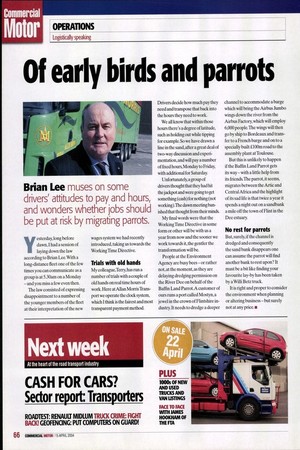Of early birds and parrots
Page 64

If you've noticed an error in this article please click here to report it so we can fix it.
Brian Lee muses on some drivers' attitudes to pay and hours, and wonders whether jobs should
be put at risk by migrating parrots.
yesterday, long before dawn, I had a session of laying down the law according to Brian Lee. With a long-distance fleet one of the few times you can communicate as a group is at 5.30am on a Monday —and you miss a few even then. The law consisted of expressing disappointment to a number of the younger members of the fleet at their interpretation of the new
wages system we had recently introduced, taking us towards the Working Time Directive. Trials with old hands
My colleague,Terry, has run a number of trials with a couple of old hands on real time hours of work. Here at Allan Morris Transport we operate the clock system, which I think is the fairest and most transparent payment method.
Drivers decide how much pay they need and transpose that back into the hours they need to work.
We all know that within those hours there's a degree of latitude, such as holding out while tipping for example. So we have drawn a line in the sand, after a great deal of two-way discussion and experimentation, and will pay a number of fixed hours, Monday to Friday, with additional for Saturday.
Unfortunately, a group of drivers thought that they had hit the jackpot and were going to get something (cash) for nothing (not working).The dawn meeting banished that thought from their minds.
My final words were that the Working Time Directive in some form or other will be with us a year from now and the sooner we work towards it, the gentler the transformation will be. People at the Environment Agency are busy bees — or rather not, at the moment, as they are delaying dredging permission on the River Dee on behalf of the Baffin Land Parrot.A customer of ours runs a port called Mostyn, a jewel in the crown of Flintshire industry. It needs to dredge a deeper
channel to accommodate a barge which will bring the Airbus Jumbo wings down the river from the Airbus Factory, which will employ 6,000 people.The wings will then go by ship to Bordeaux and transfer to a French barge and on to a specially built £100m road to the assembly plant at Toulouse.
But this is unlikely to happen if the Baffin Land Parrot gets its way — with a little help from its friends. The parrot, it seems, migrates between the Artic and Central Africa and the highlight of its sad life is that twice a year it spends a night out on a sandbank a mile off the town of Flint in the Dee estuary. No rest for parrots
But, surely, if the channel is dredged and consequently the sand bank disappears one can assume the parrot will find another bank to rest upon? It must be a bit like finding your favourite lay-by has been taken by a Willi Betz truck. It is right and proper to consider the environment when planning or altering business —but surely not at any price. •
























































































































































































